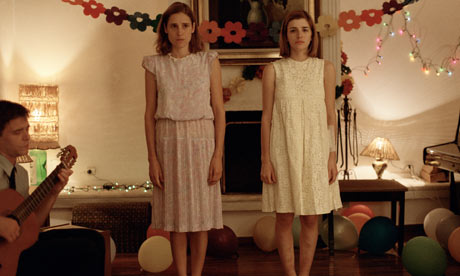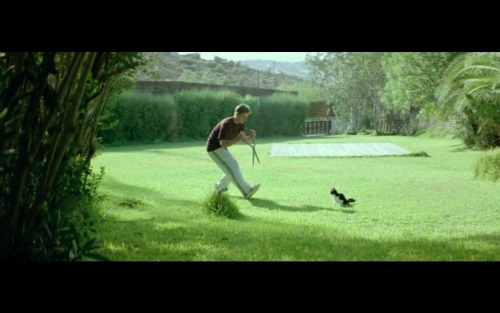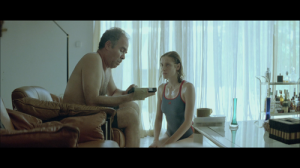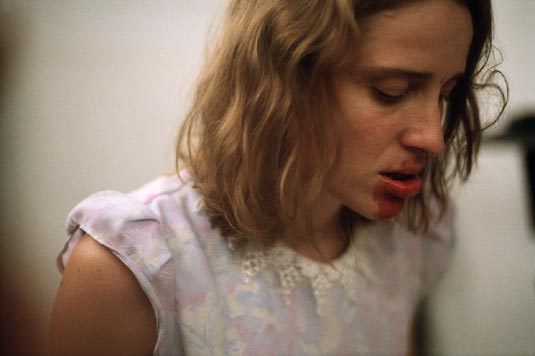
On the outskirts of a bustling Greek city live a family who dwell in their own self-sufficient, completely isolated domain. The only family member permitted to exit the home is the father, who exerts an unwavering patriarchal influence upon his wife and three unnamed children, who are credited as ‘older daughter’, ‘son’ and ‘younger daughter’. As such, without names they are unidentifiable and arguably, do not exist. Instead they simply are what they are; children and siblings. They are defined entirely by their role in conjunction with the family unit they inhabit.
The father leaves the house to attend to his work as a factory manager whilst his wife oversees the children from the home, which is devoid of any connection from the outside world, except the fleeting visits of Christina, a security guard who is employed at the fathers workplace, who arrives merely to sate the hormonal urges and sexual appetites of the son (who only really seems intrigued by one particular position).
Christina’s visits remain fit for purpose, until she tires of the indifferent and emotionless attitude of the robotic son and instead begins to flirt with the concept of exploiting the naivety of the eldest daughter, manipulating sexual favours out of her in exchange for worldly goods from beyond the confines of the home, which intrigue and excite her. This is the premise of Giorgos Lanthimos’ Dogtooth, which explores how an internal, separate world reacts to the catalytic experience of an outside intervention.

The day-to-day trivialities of family life may be permeated by Christina’s casual visits, but otherwise the children’s existences are consumed by a series of repeated, odd rituals. They are routinely taught new words, but the definitions provided are incorrect. The children are fed misinformation and lies beneath the guise of knowledge and education. The film opens with the mother relaying a succession of new words via tape: ‘The new words of the day are: "Sea", "Highway", "Road trip" and "Shotgun” , for which she assigns a series of miscellaneous meanings, which the children repeat. Any excess energy that might lure the children towards inherent restlessness is channelled into competitive sports and eccentric games that provide a healthy outlet for the sibling rivalries and potential sexual and violent tensions that may arise amongst them. The children are encouraged to catch planes that fall from the sky and are bred to be efficient but obedient.
In order to ensure that his children do not attempt to leave the sanctuary of the home, a fear of the outside and unknown is fostered. The world beyond their walls is depicted as a place of panic, terror and danger. The children are informed that they will only be able to physically deal with the dangers that dwell beyond when their dog-tooth falls out, of course in being a fictitious creation, the dog-tooth will never fall out and the children will never be permitted to leave. The father also capitalizes upon their dependence with the invention of an idea that a previous sibling, whether real or concocted, disobeyed the parents strict statutes and sanctions and was mauled to death by a cat – an animal that is depicted as the enemy, potentially as it stands for everything the father despises his own children developing as traits; independence and self-sufficiency. His status as a black sheep ensures that they do not deviate from the parents’ closeted regime.

This climate of fear means that the children remain doting and doe-eyed; the son jumps into bed with his parents and hugs the father when afraid and the arrival of a cat from the outside prompts the son to attack it with pruning shears whilst his sisters scream. The fathers’ deceit is twofold; as much as he manages to seal his family within the vacuum of a home that he has created for them by feeding them a consistent diet of lies portrayed as truths, he also safe guards the reality of their lives from his colleagues by informing them that his wife is wheelchair bound. We do not get to know the length and breadth of the story he has concocted for his children, or if anyone even knows of their existence at all.
In this way, misinformation becomes truth, and his family is allowed to exist undiscovered and undisturbed. The story centres on this family drama whilst focusing on one child in particular, the eldest, who eventually names herself ‘Bruce’ and her decision to take a leap from the frying pan into the fire. It is this contact with the outside, through the medium of two videos, ‘Jaws’ and ‘Rocky’ given to her as contraband by Christina, that motivate and inspire ‘Bruce’ to escape the family home by breaking her dog-tooth.
The fundamental question that must cross every movie goers mind on first viewing is the question most intrinsic to the plot itself: why? The film is maddening in its laid back inability to provide us with an answer. Instead, it offers up endless questions. No back-story is established that might offer up some explanation or motivation; are the parents motivated by fear or control? Are they protecting their children or imprisoning them? Are they malevolent or benevolent beings? How did this set up originate? Was the father raised under the same conditions? Is the mother an accomplice, or is she as brainwashed as her children? Are they in fact, also brother and sister? Is their intention to play God or to concoct a mini experiment, or, as a far more farfetched and imaginative individual theorised, are the parents aliens who are teaching their extraterrestrial children how to behave and become human? Finally, are they motivated by something far more mundane – boredom?

The interesting thing about film, and indeed all art, is its ability to satirize or hold up mirrors to expose ugly truths. On a domestic level, the nanny state (or politically correct/Big Brother depending on your preference) has become an increasing influence in the lives of many. We’ve all heard members of the older generation lament the loss of the days when children roamed the streets like packs of bountiful dogs, free to play, explore and have adventures. Now the outdoor world has been populated with looming evils – paedophiles, murderers, rapists, thieves, serial killers.

Perhaps this view of the world has shifted to accumulate the acceleration of rapid change; surging populations, a recession and the impact of unchecked migration. Perhaps people cannot be assured of what lies outside of their front door because it is constantly changing. The terrain is always shifting and unfamiliar. As such, modern parents are coddling, paranoid, hyper-protective, raising, as a generalisation, lazy, unproductive children, or children who have been fleshed out of steel, brought up for competition and success in a dog eat dog world where the competition gets tougher and amasses in greater numbers every year. These perfectly normal, everyday familiar fears gather great momentum in Dogtooth

Outside of the family home, there exist many other avenues through which people exist to be controlled to some degree; culture, religion (particularly those that abide extreme or fanatical teachings), abusive relationships, the government and state – in this way, people attempt to control the ones they love (or need) by making them subservient, in much the same way that man bred into the great wolf domesticity or vapid dependency into the once capable of self-survival sheep, creating a hierarchy of those that are aware, powerful and controlling and those that are ignorant, powerless and afraid. Although those that are afraid always outnumber the few in charge, they are shackled by fear to the bottom rung of the pyramid – too afraid to even attempt advancement.

The film successfully satirizes the nature vs. nurture debate, the concept of parents knowing best, patriarchal society, fiction vs. reality, lies vs. truth, xenophobia, our use of language, the trust we place in our parents, the impact of popular culture on our aspirations (it cannot be coincidence that upon viewing ‘Jaws’ and ‘Rocky’, ‘Bruce’ decides to finally break free) and the idea of art representing truth and freedom. It is in the world of creativity that 'Bruce' finds the strength to escape, not in the world of rigid and rapid domesticity and dopiness.
It is also interesting to note that ‘Bruce’ bestows herself with a male identity. Of course, she is not to know necessarily the distinction between male and female names, but it is an intriguing aside that strengthens the connection to being a woman in a man’s world, in her shrunken world – the father is King, she is servant. Is the child a slave to the parents’ wishes and expectations, or are they a separate being with desires and wants of their own, and a right to seek these in the wider world? The parents seem keen to mutate language, infer that planes are toys and interpret American songs in a way that fortifies their own sense of family – in this way their fear of outside culture, language and influence is kept at bay because it is altered before it can be processed by their children. Everything they experience comes through a screened filter.

To complicate matters further, communication and sex are intertwined. The vagina becomes a ‘keyboard’. Even if the children escape, they cannot appropriately communicate but darkly, if sex is a form of expression, this has already been skewered by the parents, who have named their parts accordingly and in a way that fragments them from normal language and society, and as such, prevents ordinary sexual encounters. The free language of the body, which cannot be contained, is marred by enforced language which has been distorted. The parents’ propaganda keeps the children under strict rule.
The calm stifled home is disrupted by one thing and one thing alone – sex. Strangely, it is the parents who voluntarily introduce this in order to sate their sons’ needs. The needs of the daughters are not only marginalised, but simply not considered. I didn’t consider the parents to be intentionally sexist as they have focused their energies on all of their children being athletic achievers. The girls are not assigned feminine roles and the son a male one – they are almost homogonous – three separate spheres of one whole. I got the impression that they were trying to raise perfect children, and sexism would mean that the daughters would be excluded from the physical ‘masculine’ sense of play. The children are encouraged to be an equal unified threesome. I think their focus on the sons sexuality stemmed from the traditionally territorial hold parents have over their daughters bodies and sexualities, as through them lies the potential for offspring that will either reflect or detract from what the family want their future to be.
There is distrust with female sexuality, which is assumed to be monogamous – but what if daughter makes the wrong choice? Her genes and influence won’t be far-reaching like her promiscuous male counterparts. As such, parents tend to enshroud female sexuality, whilst being proud and even encouraging of their sons. If we believe that men do not get emotionally attached during sex, then the son could sleep with Christina and not develop feelings, whilst the daughters might have become attached and potentially been drawn away from their family through their romantic inclinations.

Christina tires of sex with the brother but seems to know how the dynamics of the household work – she promises the older sister presents if she will ‘lick’ her. Christina, as a security guard, and essentially, a buyer of sex, takes on a masculine role and reflects the fears of the parents; that their children may become homosexual, lecherous, purveyors and consumers of sex, fetishised. We know that Christina is trusted and permitted access to the families’ inner circle, but we don’t know why; yes she is blindfolded and paid, but why does she not act? Why is she complicit in the fathers’ scheme? Is this a critique of how a consumerist, capitalist society loses sight of basic rights and wrongs when money is present? I think so. Big sums of money can silence logic, reason and conscience.
Christina brings her sex to the house and disrupts their isolated Eden. It is this act that seems to rouse oldest sisters’ curiosity and prompt her to request the tapes in exchange. Why is it that she selects these tapes? Has something been awakened in her due to her sexual encounter? There are some biblical references here that come in the form of temptation and sin (or what is arguably sin – I perceive it as the decision to choose free will). The movies ‘Bruce’ watches are violent films, which again reveal the fear of a dangerous outside world, depicted in our cultural obsession with dark materials and war, horror and thriller movies that now dominate the cinema.

It is these two dominating influences; violence and sex – so intrinsic in our own societies, which permeate the home and encourage her to look beyond. When Christina is relieved from her duties upon discovery, the son is permitted to select a daughter for his sexual release. He chooses the eldest and this further loss of innocence (the loss of the hymen) is compacted when ‘Bruce’ liberates herself of her dog-tooth, by smashing herself in the face with a dumbbell.
This re-enactment of the loss of her virginity is represented by her grotesque, stark bleeding and the interweaving of her rebellion and liberation, as well as the violent necessity of the process. I found the dog-tooth to have an affiliation with the presence of the hymen, which indicates wholesomeness, innocence and self-containment, once it is broken those traits are symbolically dispersed. The dog-tooth also holds these qualities – with it the children can remain in the home, if they lose it they are out. ‘Bruce’ must offer up a sacrifice to the only Gods she knows – her parents, in exchange for freedom. Ironically, everything the parents fear for their children comes to the house. I can’t help but think; does this make them right? Christina does prove to be a bad influence...a very bad one indeed.

So what to make of this bleak and banal portrait of family life? There are distinctive similarities to the works of Lars Von Trier in terms of his dystopian outlook on society and its tendencies and this film acts as a microcosm of the wider world – a Petri dish of our own perversions exemplified beneath the microscope. This movie has been described as ‘brilliant and bizarre’, ‘ingenious’ and ‘brilliant, dark and disconcertingly funny’. Though I would fundamentally agree that all of the above are true, the concept is more intriguing than the realisation. The unfleshed out back-story, which isn’t really necessary, still provokes a lot of incessant questioning in my frantic mind, and is more intriguing. Some of the scenes will make you squirm and the depiction of incest, self-mutilation and casual outbursts of violence and in-fighting will not cater to more sensitive palettes but this is a film that provokes much contemplation and discussion, with regards to how our identities, cultures, language and families are shaped by outside influences and for that reason, is well worth watching.
The film ends with ‘Bruce’ escaping the home only to lock herself in the boot of her father’s car showing that even if we desire to escape the hold of our conditioning, it is sometimes so engrained in us that escape is futile. We will keep coming back to the origin, to the source, to the trap – as the parents in this film intended.
Astonishing.
ReplyDeletethank you for this. I just watched the movie and the emotional toll it took on me prevented me from understanding much of what i just saw. it was hard to watch at times, but i'm glad i did. I'm also glad i found your blog because it will help me sort the thoughts that are making my head spin.
ReplyDeleteHi Steph,
ReplyDeleteIt's definitely a very thought provoking film. I personally love films like that although Dogtooth did leave me feeling really numb afterwards - there are so many horrible subjects covered by the film, but it's a really fun one to analyse purely because it's so provocative. Have you ever seen the film 'Oldboy'? It's a horror film that deals with similar issues. Not easy to watch but so much fun to pick apart afterwards!
K
xxxx